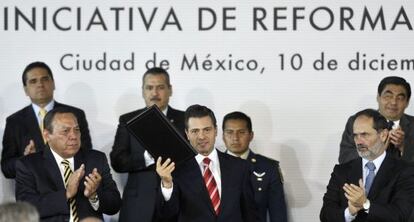Peña Nieto surprises Mexicans by ceding ground to disgruntled teachers
Leaked document of a secret meeting suggests PRI government will tweak education law


Just months after vowing that his government will not turn its back on its far-reaching education reform, President Enrique Peña Nieto has apparently agreed to some concessions after holding secret talks with disgruntled teachers, according to minutes of the private encounter leaked to the press.
The sweeping reforms were passed in September by a large congressional majority. Among the provisions in the law are mandatory evaluations for all teachers and a census procedure to see how many educators who are on the government payroll are actually teaching in classes.
Since April, teachers and their supporters have been holding a series of protests across the country, even camping out for months in Mexico City’s main Zócalo square until they were evicted by authorities several days before the country’s Independence Day celebrations got underway in September. The protestors have now moved their campsite to the Monument of the Revolution, located in another important plaza in the capital.
Meanwhile, the current school term has already begun throughout the country, although in some states students have not been able to return to class because of striking teachers.
Peña Nieto’s struggle with the powerful SNTE teachers union seemed to be a success until last week when details of a secret meeting between a dissenting educators’ faction and officials from the presidential chief of staff’s office (Segob) was leaked to the press.
Signed by Deputy Chief of Staff Luis Enrique Miranda – a close advisor to Peña Nieto – the document outlines a list of concessions the Institutional Revolutionary Party (PRI) government agreed to with the National Coordinator of Education Workers (CNTE) – the SNTE dissident group that has been leading the protests.
These types of negotiations are very undemocratic and unacceptable”
The CNTE has been gaining support over the past few months, representing teachers in 22 of the country’s 31 states.
“These types of negotiations are very undemocratic and completely unacceptable,” said political analyst Ricardo Raphael.
Miranda has reportedly agreed to soften the terms regarding teachers’ evaluations, an issue at the heart of the reform. Under the law, teachers will be given tests in which they have at least three opportunities to pass or be expelled from the classrooms. In Mexico some teachers inherit lifelong posts from relatives or are offered appointments as a political favor.
But the document that Miranda signed on November 5 pledges that the government will not fire any teacher who performs poorly in the evaluation. “Teachers will have an active participation in designing their evaluations,” it said.
“The exams are a basic reference guide. They will tell you which teachers are in classroom due to their vocation, which ones are there because they inherited the position, and even those who have been receiving a salary who have never stepped inside a classroom,” said political analyst Maite Azuela.
For years, the powerful SNTE union, once led by Elba Esther Gordillo, who has been awaiting trial in jail since her arrest in February on embezzlement charges, controlled the hiring and firing process of teachers across the country.
More than 90 percent of Mexico’s education budget goes to pay teachers’ salaries, but as of today the total number of educators who actually teach in a classroom is not known. One of the provisions in the reform is to conduct a census of all classroom teachers and find out who are those that are on the public payroll but are actually doing some teaching.
According to the NGO Mexicanos Primeros, there are at least 23,553 people who are collecting salaries as teachers but have never been in front of a class. “Officials cannot designate new teachers in a discretionary manner,” the government reportedly pledges in the document.
The leaked report has drawn the ire of those who have long been supporting reform, including research centers, NGOs and education experts. And no one knows why the Peña Nieto government has given into such demands even after the law has been approved. There are also questions over whether the document is binding: no CNTE official’s signature appears on the report.
As of Tuesday, PRI administration officials have not commented on the talks.
“A unilateral decision by Segob cannot derail the entire process,” said analyst Azuela. “What could happen is that the PRI could begin to retract some of its commitments; something that is difficult but not impossible. I see this as a blow to the reform.”
The analyst speculated that perhaps the secret talks are part of a ploy by the PRI to lead the CNTE to believe it has won a victory as the government tries to quell the chaos caused by the protests that have overtaken the capital and spread across the nation. “But this has its consequences because while the tensions may ease, implementing the reforms will be delayed,” she said.







































